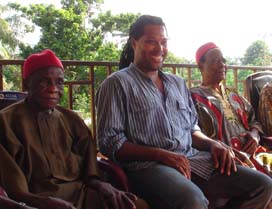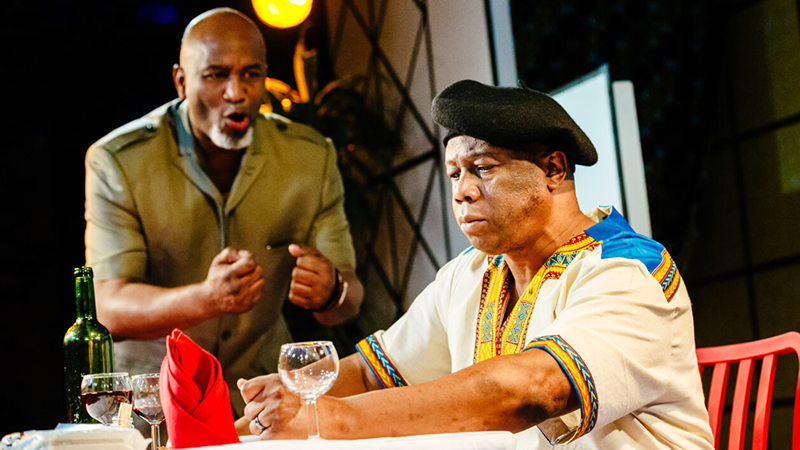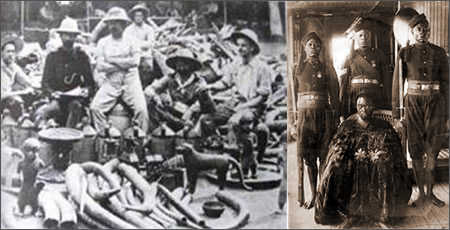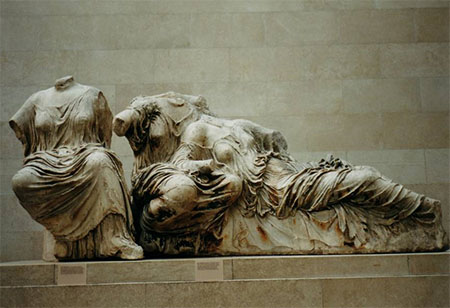The Last Slave follows 38 year old David Monteith, an actor and youth drugs worker from Hackney as he travels to Jamaica and Calabar, Nigeria in search of information about one of his Ancestors. His great great great Ibo grandfather, Aneaso, later and more commonly known as Archibald Monteith, was kidnapped from Nigeria and transported by european slavers to work on forced labour camps in Jamaica as an enslaved African. During his search, David relies upon Archibald Monteith’s manuscript to inform his journey. The documentary is made by October films, a leading British independent film and television production company.

With the 200th anniversary of the 1807 parliamentary Act to abolish the British slave trade fast approaching, the revisionist rewriting of history continues to pervade the British media and the public psyche. The intent is to convert the story of centuries of barbaric and unrelenting British slavery which enacted the most extreme inhumane treatment of innocent African people to a revisionist feel good epic about the role of a negligible number of european abolitionists and a minority of African people involved in procuring fellow Africans for european slavers. The Last Slave, itself a misleading title, broadcast on Sunday 11th March at 8pm on Channel 4 was merely the latest contribution to this manipulation of history.
The apparent sincerity of David Monteith, the documentary’s protagonist is not difficult to believe. Nor is his insistence that he wanted to genuinely find out more about his Ancestor and the impact of British slavery on African people. In a recent interview he said "One of the revelations for me was to stop looking at slaves as slaves, but to look at them as people who overcame brutalisation and dislocation, who managed to find a way to persevere. They endured, they profited, they found a way to build a life. But I realised that I come from a very proud heritage, that I'm descended from someone who had all those qualities and that makes me amazing. My responsibility is to build on that, not to let it go to waste."
Unfortunately, his naivety lends itself to the documentary makers agenda to cynically exploit his experience to promote the notion that there was a widespread policy of African people "selling" other Africans willingly into european slavery and that the British slavers were simply unwitting participants in state sanctioned human rights abuses. In essence, the portrayal of this element of the Maafa will have had europeans breathing a sigh of relief, as they find comfort in the mistaken belief that maybe their role in African enslavement wasn’t so bad after all. Conversely, it will enrage many who saw through this transparent manipulation of our history. Further, it will encourage those African people who have not been afforded a robust and holistic education of history to absorb and in some cases ferment the one-dimensional assertion that African people permitted the kidnap of their fellow Africans by european slavers.
One of the principle problems with this documentary from a critical perspective was the complete and unquestionable reliance on the manuscript of Aneaso (Archibald Monteith). David himself observes that there is a lack of emotional response from the author of the manuscript. "I think what really takes me aback is he doesn't talk about his emotions at arriving on land after all that time its just bang we arrived bang I was sold bang I was taken to this estate you know but what happened in between? It's frustrating because you want to know what goes through a man's mind at a time like that." Part of the reason for this apparent lack of personal reaction can no doubt be attributed to the fact that this narrative, as with many narratives written by or transcribed from the dictation of formerly enslaved African people, were written, recorded and/ or edited by european Christians. In the case of Aneaso, he dictated his account to Reverend Joseph Horsfield Kummer, a Moravian missionary in the 1850s. Consequently, his narrative centres on his ‘conversion’ from his African spiritual belief system to the assimilation with the Moravian religion. There is much evidence and commentary to suggest that the Moravians were more interested in recording Aneaso’s story for the purposes of recruitment into their religion than for the merit and value of the story of an enslaved African. The Moravian’s would repeatedly use this manuscript to impose their religion on other enslaved Africans both nationally in Jamaica and internationally in other countries where they had missionary bases. The text was even translated from English for a Moravian periodical in Germany. To this end, Aneaso was promoted by the Moravians as a ‘capable and devoted helper’ and a ‘valuable servant’.
With the emotional trauma of being kidnapped from his home, the horrendous journey and conditions aboard the slaver ships during the middle passage and the eventual arrival in a foreign place only to be callously sold and forced to work being omitted or minimised in the narrative, it is difficult to blindly accept the premise set by the documentary makers that this was indeed an credible and sincere attempt to enlighten David about his Ancestor.
Whilst many of David’s conclusions are somewhat dubious, in fairness it can be said that this was as a result of his simplistic analysis of the evidence presented to him rather than a devious attempt to malign African people. He is the unfortunate and unconscious victim of desperate documentary makers attempting to promote a cynically engineered agenda to relieve Britons of any sense of guilt for the role of their nation in exploiting innocent African people. Ultimately, his unchallenging approach and his willingness to absorb information at a superficial level are cringeworthy. Short of shouting at the screen however, the viewer is left feeling exasperated by his and the documentary makers continued failure to ask the vast number of critical questions that would have revealed a more holistic and appropriate perspective of the experience of his Ancestor. The incomplete and lazy tone of this documentary can also be attributed to the selective editing. Ironically, just as the narrative of Aneaso was transcribed and tailored by europeans with an ulterior motive, David too was used and significant elements of his story were simply not told or deliberately excluded. The constant use of the dehumanising label ‘slave’ that littered the documentary, rather the more accurate and respectful descriptions of ‘African’ or ‘enslaved African’, also revealed the documentary makers insensitive and carefree approach to this very emotive subject.
The uncritical acceptance of information is none so visible than when the idea that African people permitted their children to be abducted for enslavement is raised. David concludes "I was listening to people and I know what I wanted them to say that and they wouldn't. They weren't saying slavery was a bad thing. That is not what I travelled this far to hear. Domestic slavery it seems was just a way of life."
The documentary began by proclaiming its intention to uncover ‘uncomfortable truths’. For any African familiar with the media lexicon surrounding the issue of enslavement, this would have immediately raised warning bells as to the direction of was a farcical and exaggerated attempt to promote a contorted myth as a widescale phenomena. Sadly, David appears to accept this myth. In an interview with the Guardian newspaper he says;
"I went to meet Prince Iamba from the Efik people, who live along the coast, and they would sell people from inland to European traders. His great-great-great-grandfather would have been king at the time that Archibald was alive, so there's a probability that his ancestor sold my ancestor. He took me into the family shrine and showed me this drum made of brass that the king had made in 1845 and had shipped over. It cost him 10 slaves. There was this anger in his eyes and he turned to this antiquity and gave it a resounding kick and said, 'For what? Ten lives wasted so this can sit here gathering dust.' That someone was angry about our heritage and willing to take responsibility helped me regain my equilibrium".
The fact that a small number of people were coerced into this type of activity is unquestionable. However, of those who were forced to do so through threat of extreme violence, sanction and indeed enslavement by european slavers, it is important to remember that the inhumane nature of european slavery was unheard of in Africa and unimaginable to the African mind. David himself concedes that “I don’t think that at the time Africans realised what was happening with the European slave trade.”
The Efik people from Old Calabar, Nigeria have been documented to have encounters with european slavers from the seventeenth century. They generally procured African from Igbo and Ibibio regions who were outside their ‘insider’ community. In many instances, family members of the Efik would be held as ‘pawns’ on european slaver ships to ensure that they delivered the quantity and quality of African people required and subsequently repaid any outstanding ‘debts’. There are accounts of British slavers betraying this arrangement with many of these so-called ‘pawns’ being kidnapped if, for example, a slaver deemed that the Efik people were taking too long to procure African people for the purposes of enslavement. What emerges on reading sources relating to this specific issue is that the Efik themselves felt under threat of enslavement and certainly attempted to protect against this by the instigation of secret societies within the community but also by ensuring that the slavers were supplied with the people they required.
Another particularly indigestible moment in the documentary is the encounter that David has with David Farquharson, an unrepentant and direct descendant from a family of "Jamaican" slavers. Farquharson is not only unapologetic about his family’s role in the forced exploitation of African people but he is proud of his inheritance from what he himself describes as ‘legalised torture’. Bizarrely, Farquharson attempts to justify the savagery and injustice of enslavement by claiming that current standards of morality and human rights can not be applied to the ‘past’ system of slavery enjoyed by his ancestors. The most likely scenario however, is that Farquharson’s ancestors were more than aware of the barbaric nature of their enslavement. Indeed, David’s visit to a museum in Jamaica reveals that slavers specifically commissioned the construction of tortuous implements to subjugate our Ancestors including ‘branding’ irons which were callously burned onto their bodies. The vast measure of torturous instruments and methods, including the horrific and humiliating ‘eating sh**’ process fleetingly referred to in the documentary, which involved restraining an African person and defecating into their mouth, were the construction of a depraved British imagination. The modern phrase ‘eat sh**’ derives from this practice. It is difficult to believe that such methods were not seen, even by the slavers, as the dehumanising and immoral acts they undoubtedly were.
With the editing out of his control, we are left in the dark as to whether David further probed Farquharson on this ridiculous assertion. However, his later pronouncement that Farquharson was a “nice guy who loved Jamaica” certainly leaves us with little reassurance. As if the offensive projections of Africans indifferent to the kidnapping of their children and a romantic portrayal of a benevolent slaver descendant are not enough, there is one yet another assault on the history of the Maafa: the maligning of those who suffered under the brutal system of slavery.
There was a very sinister undertone to this documentary which raised doubts as to the real story of Aneaso. Despite being portrayed in the documentary and the original Moravian narrative as a ‘faithful servant’ who was eventually afforded the ‘privilege’ of being a ‘gang driver', there are several inconsistencies that suggest that this story is not as straightforward as it first seems. Towards the end of Aneaso’s narrative we learn that he ‘bought’ his freedom as soon as he was able to rather than wait for the institutional abolition of slavery. This suggests that he was far from content with being a ‘servant’ and like the millions of enslaved African people never forgot Africa nor did he forgo his natural craving for freedom despite being a young child when he was kidnapped. According the documentary, Aneaso may have been ‘promoted’ to the status of a ‘gang driver’ who was responsible for ensuring that the African people forced to labour for the benefit of British slavers were ‘productive’. It is asserted that he may have been in possession of a whip with which to inflict physical punishment on behalf of the slaver. David concludes that he is very uncomfortable and troubled by the notion that his Ancestor may have been part of the system of oppression. Again, his logic is flawed by a lack of understanding of the overwhelming and brutal influence of the slaver. It is unlikely that if Aneaso was in the position, that he would have enjoyed having to brutalise his fellow Africans. He would have been made to understand that he had little choice in the matter. It was certainly not a career move or ‘promotion’ in modern terms. What this fictitious recounting does do is suggest that Africans were implicit in their own mistreatment.
The sum total of this audacious assault on history is that David erroneously surmises that slavery was not just ‘black and white’ or about the ‘oppressors and the oppressed’. He, as with other viewers are duped into believing an odious propagation of a revisionist history that again seeks to absolve the British psyche of any guilt or responsibility for the unprovoked, immoral, exploitative enslavement of African people and the subsequent contravention of their human rights. The obvious travesty of this fairytale history is the complete omission of the millions of African people who resisted and revolted in Africa, on the slaver ships and in the Diaspora. That this hugely significant element of the Maafa continues to be ignored is no accident. Admittedly some may be some who are ignorant of this history but there are those who actively seek to undermine the instrumental actions and indomitable spirit of the Africans whose courage dwarfs the political antics of the likes of the gradual abolitionist and pro-colonial MP, William Wilberforce. It also raises a question that few of Britain’s ethnic majority will dare to ask themselves; If a minority of African people who came into contact with european slavery were involved in procuring Africans for european slavers, why does this remain the most widely distributed and pervasive definition of enslavement rather than the accounts of the millions of Africans who were involved in resistance and revolution? Needless to say the numerous raids and methods by which the european slavers kidnapped people from Africa, the horrific reality on board the slaver ships and forced labour camps throughout the Americas and the Caribbean are also given markedly less attention.
The Last Slave forms part of the large body of contributing factors to this ludicrous and offensive state of affairs. This documentary manages to implicate all the African people as being instruments in their own enslavement and the europeans as unwitting individuals coerced into doing something they were unaware was wrong. In fact, the europeans involved in this assault are largely limited to faceless British buildings and institutions. Not only does it show a very limited understanding of history but it suggests that despite many asserting that we need to move on from slavery, the ideological stand point of the British psyche has yet to move on from their historic and current attempts to justify the unjustifiable. Until Britain confronts the moral dilemma of its countless uncomfortable truths, they will remain in a perpetual state of immaturity which goes hand in hand with a perpetual state of denial and a fear that those who have been and continue to be oppressed will continue to galvanise in the spirit of our Ancestors who confronted injustice and fought for freedom by any means necessary.
There is not shame in feeling guilt. In fact, to feel guilty shows a level of empathy and humanity that has been missing for centuries in the european response to the issue of African enslavement. Skirting around apologies, playing political games with politically engineered anniversaries’ and throwing out the occasional concessionary carrot to attempt to seduce Africans into colluding with the Wilberfest agenda in 2007 are indicative of a government that is acutely aware African people are no longer passively accepting their assimilation fodder. We are no longer willing to adopt their value systems and will continue to work towards reclaiming the identity, culture and history that was and continues to be unjustly denied us.

External Links
Channel 4 to join Maafa assault with Last Slave documentary

David Monteith (centre) with Elders in Calabar, Nigeria
The apparent sincerity of David Monteith, the documentary’s protagonist is not difficult to believe. Nor is his insistence that he wanted to genuinely find out more about his Ancestor and the impact of British slavery on African people. In a recent interview he said "One of the revelations for me was to stop looking at slaves as slaves, but to look at them as people who overcame brutalisation and dislocation, who managed to find a way to persevere. They endured, they profited, they found a way to build a life. But I realised that I come from a very proud heritage, that I'm descended from someone who had all those qualities and that makes me amazing. My responsibility is to build on that, not to let it go to waste."
Unfortunately, his naivety lends itself to the documentary makers agenda to cynically exploit his experience to promote the notion that there was a widespread policy of African people "selling" other Africans willingly into european slavery and that the British slavers were simply unwitting participants in state sanctioned human rights abuses. In essence, the portrayal of this element of the Maafa will have had europeans breathing a sigh of relief, as they find comfort in the mistaken belief that maybe their role in African enslavement wasn’t so bad after all. Conversely, it will enrage many who saw through this transparent manipulation of our history. Further, it will encourage those African people who have not been afforded a robust and holistic education of history to absorb and in some cases ferment the one-dimensional assertion that African people permitted the kidnap of their fellow Africans by european slavers.
One of the principle problems with this documentary from a critical perspective was the complete and unquestionable reliance on the manuscript of Aneaso (Archibald Monteith). David himself observes that there is a lack of emotional response from the author of the manuscript. "I think what really takes me aback is he doesn't talk about his emotions at arriving on land after all that time its just bang we arrived bang I was sold bang I was taken to this estate you know but what happened in between? It's frustrating because you want to know what goes through a man's mind at a time like that." Part of the reason for this apparent lack of personal reaction can no doubt be attributed to the fact that this narrative, as with many narratives written by or transcribed from the dictation of formerly enslaved African people, were written, recorded and/ or edited by european Christians. In the case of Aneaso, he dictated his account to Reverend Joseph Horsfield Kummer, a Moravian missionary in the 1850s. Consequently, his narrative centres on his ‘conversion’ from his African spiritual belief system to the assimilation with the Moravian religion. There is much evidence and commentary to suggest that the Moravians were more interested in recording Aneaso’s story for the purposes of recruitment into their religion than for the merit and value of the story of an enslaved African. The Moravian’s would repeatedly use this manuscript to impose their religion on other enslaved Africans both nationally in Jamaica and internationally in other countries where they had missionary bases. The text was even translated from English for a Moravian periodical in Germany. To this end, Aneaso was promoted by the Moravians as a ‘capable and devoted helper’ and a ‘valuable servant’.
With the emotional trauma of being kidnapped from his home, the horrendous journey and conditions aboard the slaver ships during the middle passage and the eventual arrival in a foreign place only to be callously sold and forced to work being omitted or minimised in the narrative, it is difficult to blindly accept the premise set by the documentary makers that this was indeed an credible and sincere attempt to enlighten David about his Ancestor.
Whilst many of David’s conclusions are somewhat dubious, in fairness it can be said that this was as a result of his simplistic analysis of the evidence presented to him rather than a devious attempt to malign African people. He is the unfortunate and unconscious victim of desperate documentary makers attempting to promote a cynically engineered agenda to relieve Britons of any sense of guilt for the role of their nation in exploiting innocent African people. Ultimately, his unchallenging approach and his willingness to absorb information at a superficial level are cringeworthy. Short of shouting at the screen however, the viewer is left feeling exasperated by his and the documentary makers continued failure to ask the vast number of critical questions that would have revealed a more holistic and appropriate perspective of the experience of his Ancestor. The incomplete and lazy tone of this documentary can also be attributed to the selective editing. Ironically, just as the narrative of Aneaso was transcribed and tailored by europeans with an ulterior motive, David too was used and significant elements of his story were simply not told or deliberately excluded. The constant use of the dehumanising label ‘slave’ that littered the documentary, rather the more accurate and respectful descriptions of ‘African’ or ‘enslaved African’, also revealed the documentary makers insensitive and carefree approach to this very emotive subject.
The uncritical acceptance of information is none so visible than when the idea that African people permitted their children to be abducted for enslavement is raised. David concludes "I was listening to people and I know what I wanted them to say that and they wouldn't. They weren't saying slavery was a bad thing. That is not what I travelled this far to hear. Domestic slavery it seems was just a way of life."
The documentary began by proclaiming its intention to uncover ‘uncomfortable truths’. For any African familiar with the media lexicon surrounding the issue of enslavement, this would have immediately raised warning bells as to the direction of was a farcical and exaggerated attempt to promote a contorted myth as a widescale phenomena. Sadly, David appears to accept this myth. In an interview with the Guardian newspaper he says;
"I went to meet Prince Iamba from the Efik people, who live along the coast, and they would sell people from inland to European traders. His great-great-great-grandfather would have been king at the time that Archibald was alive, so there's a probability that his ancestor sold my ancestor. He took me into the family shrine and showed me this drum made of brass that the king had made in 1845 and had shipped over. It cost him 10 slaves. There was this anger in his eyes and he turned to this antiquity and gave it a resounding kick and said, 'For what? Ten lives wasted so this can sit here gathering dust.' That someone was angry about our heritage and willing to take responsibility helped me regain my equilibrium".
The fact that a small number of people were coerced into this type of activity is unquestionable. However, of those who were forced to do so through threat of extreme violence, sanction and indeed enslavement by european slavers, it is important to remember that the inhumane nature of european slavery was unheard of in Africa and unimaginable to the African mind. David himself concedes that “I don’t think that at the time Africans realised what was happening with the European slave trade.”
The Efik people from Old Calabar, Nigeria have been documented to have encounters with european slavers from the seventeenth century. They generally procured African from Igbo and Ibibio regions who were outside their ‘insider’ community. In many instances, family members of the Efik would be held as ‘pawns’ on european slaver ships to ensure that they delivered the quantity and quality of African people required and subsequently repaid any outstanding ‘debts’. There are accounts of British slavers betraying this arrangement with many of these so-called ‘pawns’ being kidnapped if, for example, a slaver deemed that the Efik people were taking too long to procure African people for the purposes of enslavement. What emerges on reading sources relating to this specific issue is that the Efik themselves felt under threat of enslavement and certainly attempted to protect against this by the instigation of secret societies within the community but also by ensuring that the slavers were supplied with the people they required.
Another particularly indigestible moment in the documentary is the encounter that David has with David Farquharson, an unrepentant and direct descendant from a family of "Jamaican" slavers. Farquharson is not only unapologetic about his family’s role in the forced exploitation of African people but he is proud of his inheritance from what he himself describes as ‘legalised torture’. Bizarrely, Farquharson attempts to justify the savagery and injustice of enslavement by claiming that current standards of morality and human rights can not be applied to the ‘past’ system of slavery enjoyed by his ancestors. The most likely scenario however, is that Farquharson’s ancestors were more than aware of the barbaric nature of their enslavement. Indeed, David’s visit to a museum in Jamaica reveals that slavers specifically commissioned the construction of tortuous implements to subjugate our Ancestors including ‘branding’ irons which were callously burned onto their bodies. The vast measure of torturous instruments and methods, including the horrific and humiliating ‘eating sh**’ process fleetingly referred to in the documentary, which involved restraining an African person and defecating into their mouth, were the construction of a depraved British imagination. The modern phrase ‘eat sh**’ derives from this practice. It is difficult to believe that such methods were not seen, even by the slavers, as the dehumanising and immoral acts they undoubtedly were.
With the editing out of his control, we are left in the dark as to whether David further probed Farquharson on this ridiculous assertion. However, his later pronouncement that Farquharson was a “nice guy who loved Jamaica” certainly leaves us with little reassurance. As if the offensive projections of Africans indifferent to the kidnapping of their children and a romantic portrayal of a benevolent slaver descendant are not enough, there is one yet another assault on the history of the Maafa: the maligning of those who suffered under the brutal system of slavery.
There was a very sinister undertone to this documentary which raised doubts as to the real story of Aneaso. Despite being portrayed in the documentary and the original Moravian narrative as a ‘faithful servant’ who was eventually afforded the ‘privilege’ of being a ‘gang driver', there are several inconsistencies that suggest that this story is not as straightforward as it first seems. Towards the end of Aneaso’s narrative we learn that he ‘bought’ his freedom as soon as he was able to rather than wait for the institutional abolition of slavery. This suggests that he was far from content with being a ‘servant’ and like the millions of enslaved African people never forgot Africa nor did he forgo his natural craving for freedom despite being a young child when he was kidnapped. According the documentary, Aneaso may have been ‘promoted’ to the status of a ‘gang driver’ who was responsible for ensuring that the African people forced to labour for the benefit of British slavers were ‘productive’. It is asserted that he may have been in possession of a whip with which to inflict physical punishment on behalf of the slaver. David concludes that he is very uncomfortable and troubled by the notion that his Ancestor may have been part of the system of oppression. Again, his logic is flawed by a lack of understanding of the overwhelming and brutal influence of the slaver. It is unlikely that if Aneaso was in the position, that he would have enjoyed having to brutalise his fellow Africans. He would have been made to understand that he had little choice in the matter. It was certainly not a career move or ‘promotion’ in modern terms. What this fictitious recounting does do is suggest that Africans were implicit in their own mistreatment.
The sum total of this audacious assault on history is that David erroneously surmises that slavery was not just ‘black and white’ or about the ‘oppressors and the oppressed’. He, as with other viewers are duped into believing an odious propagation of a revisionist history that again seeks to absolve the British psyche of any guilt or responsibility for the unprovoked, immoral, exploitative enslavement of African people and the subsequent contravention of their human rights. The obvious travesty of this fairytale history is the complete omission of the millions of African people who resisted and revolted in Africa, on the slaver ships and in the Diaspora. That this hugely significant element of the Maafa continues to be ignored is no accident. Admittedly some may be some who are ignorant of this history but there are those who actively seek to undermine the instrumental actions and indomitable spirit of the Africans whose courage dwarfs the political antics of the likes of the gradual abolitionist and pro-colonial MP, William Wilberforce. It also raises a question that few of Britain’s ethnic majority will dare to ask themselves; If a minority of African people who came into contact with european slavery were involved in procuring Africans for european slavers, why does this remain the most widely distributed and pervasive definition of enslavement rather than the accounts of the millions of Africans who were involved in resistance and revolution? Needless to say the numerous raids and methods by which the european slavers kidnapped people from Africa, the horrific reality on board the slaver ships and forced labour camps throughout the Americas and the Caribbean are also given markedly less attention.
The Last Slave forms part of the large body of contributing factors to this ludicrous and offensive state of affairs. This documentary manages to implicate all the African people as being instruments in their own enslavement and the europeans as unwitting individuals coerced into doing something they were unaware was wrong. In fact, the europeans involved in this assault are largely limited to faceless British buildings and institutions. Not only does it show a very limited understanding of history but it suggests that despite many asserting that we need to move on from slavery, the ideological stand point of the British psyche has yet to move on from their historic and current attempts to justify the unjustifiable. Until Britain confronts the moral dilemma of its countless uncomfortable truths, they will remain in a perpetual state of immaturity which goes hand in hand with a perpetual state of denial and a fear that those who have been and continue to be oppressed will continue to galvanise in the spirit of our Ancestors who confronted injustice and fought for freedom by any means necessary.
There is not shame in feeling guilt. In fact, to feel guilty shows a level of empathy and humanity that has been missing for centuries in the european response to the issue of African enslavement. Skirting around apologies, playing political games with politically engineered anniversaries’ and throwing out the occasional concessionary carrot to attempt to seduce Africans into colluding with the Wilberfest agenda in 2007 are indicative of a government that is acutely aware African people are no longer passively accepting their assimilation fodder. We are no longer willing to adopt their value systems and will continue to work towards reclaiming the identity, culture and history that was and continues to be unjustly denied us.

External Links
Channel 4 to join Maafa assault with Last Slave documentary
Ligali is not responsible for the content of third party sites





Get involved and help change our world